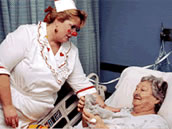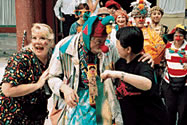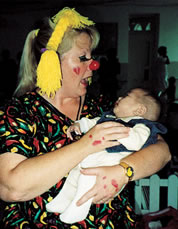 |
|||||||||||||||||

|
||||||||||||||||||||
Marcy Graves ('81) knew she'd need three things when she flew to China last September: A stash of Pop-Tarts, the know-how to ask for a bathroom and the words to say “I love you.” After all, she was traveling as a goodwill ambassador to spread laughter and love with Patch Adams and his Humor in Medicine Delegation. For her trip to Russia this summer, she’s added one more thing to the list. “Sixteen days in China with no Diet Coke taught me that Pop-Tarts alone were not enough to maintain the American diet,” the buxom, blue-eyed blonde says happily while applying her 3-inch-long, rhinestone-studded eyelashes. “So before we head off to Siberia, I intend to know how to ask for a Diet Coke.” The troupe of 20-some-odd clowns will spend two weeks in Russia beginning Aug. 15. While there, they’ll visit hospitals, orphanages, nursing homes and schools, as well as streets, subways and hotels to spread joy and laughter. Just as they did in China.
Birth of the HaHaS Graves was clowning around long before she met Patch Adams. But, her professional alter ego of Nurse Ducky and her duck hand puppet, Quackers, are closely tied to the legendary physician. When Robin Williams made the real-life doctor of laughter famous to the general public in the 1999 movie Patch Adams, Graves was in the theater on opening day. “When I watched the way Patch interacted with his patients on screen, I remember thinking, ‘This is me! I do this at work every day,’” she says. After the man behind her asked her to sit down and be quiet, Graves, a respiratory therapist of 21 years, says she realized it was her God-given mission to go forth and spread humor and healing along with hand-held nebulizers and chest percussion. After all, she is probably the only premed graduate to also study theater at North Texas. So, as director of cardiopulmonary and extended-care services at Harris Methodist Southwest in Fort Worth, Graves went to her hospital’s executive board with Quackers in tow. She explained how she had been dressing up as Nurse Ducky and taking Quackers to visit nursing homes in her hometown, Granbury, for years. “I told them that if they could spend just one hour behind my eyes and see the joy a clown brings to a patient, there would be a clown in every hospital in the world,” she says. “And that would truly be health care reform.” After the presentation, which came with the assurance that the program would cost the hospital nothing, the HaHaS — Healing and Humor at Southwest — were born.
Clown rounds The group of therapists, nurses, doctors and staff don their red noses, pouty red lips and costumes every Wednesday for clown rounds. Before entering a room, Nurse Ducky asks if the patient is up for a visit. “We assume everybody wants to see us, but just to be sure, we ask,” she says. “Women in labor don’t usually respond well.” Upon a yes, she sprays a stream of bubbles to announce the group and drags her little red wagon full of fun into the room. Once there, the clowns all chat with the patient and entertain in their own unique way. Miss EKG finds the beat with her electronic drum machine, Ima Green Frogg makes what’s “buggin’” them disappear in her magical scarf, while Dr. Cat Scan checks for funny bones, and on and on. Quackers usually gets in bed with the patient and passes out big duck kisses. Before they leave, the clowns sing “Happy HaHa to You” and snap the patient’s “photo,” a hand-drawn caricature left as a reminder of the visit. “That way people don’t have to wonder if it was just the drugs when they think they remember the group of funny people who stopped by,” Graves says.
Patch match Six months into the program, Graves did a clinical study on the effects of humor on pneumonia patients (it’s very beneficial). She wrote an abstract and presented it in full Nurse Ducky costume at the American Association of Respiratory Care International Convention in Las Vegas in November 1999. Enter the real Patch Adams. The abstract of Graves’ study and presentation was included in the AARC journal, and upon reading it, the physician contacted her about joining him in China. “He didn’t have to ask me twice,” she says. The trip to China changed her life forever, Graves says. When she left, she waved goodbye to the hospital ward full of patients whose heads were adorned with duck hats, and she renewed her commitment to the role of humor in healing. “Healing clowns bring healing energy to the bodies, minds and spirits of the sick and their families,” she says. “They offer complementary therapy to traditional medical treatments.” And Graves says she will continue to use humor “to cope, to survive, to heal, to grow and to pass on loving kindness. “And
on the day of my death, I will look back and know I laughed lovingly,
fully and well.”
|
||||||||||||||||||||
|
||||||||||||||||||||


